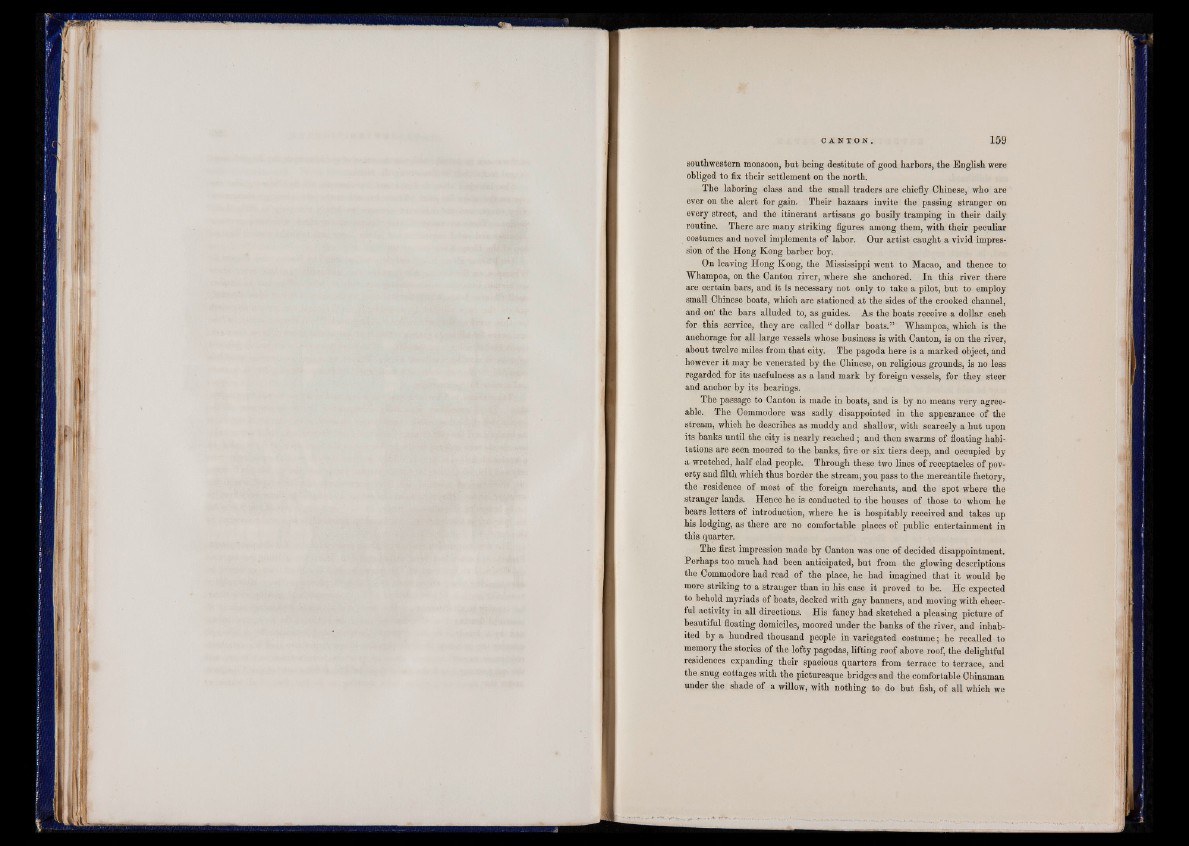
southwestern monsoon, but being destitute of good harbors, the English were
obliged to fix their settlement on the north.
The laboring class and the small traders are chiefly Chinese, who are
ever on the alert for gain. Their bazaars invite the passing stranger on
every street, and thé itinerant artisans go busily tramping in their daily
routine. There are many striking figures among them, with their peculiar
costumes and novel implements of labor. Our artist caught a vivid impression
of the Hong Kong barber boy.
On leaving Hong Kong, the Mississippi went to Macao, and thence to
Whampoa, on the Canton river, where she anchored. In this river there
are certain bars, and it is necessary not only to take a pilot, but to employ
small Chinese boats, which are stationed at the sides of the crooked channel,
and on' the bars alluded to, as guides. As the boats receive a dollar each
for this service, they are called “ dollar boats.” Whampoa, which is the
anchorage for all large vessels whose business is with Canton, is on the river,
about twelve miles from that city. The pagoda here is a marked object, and
however it may be venerated by the Chinese, on religious grounds, is no less
regarded for its usefulness as a land mark by foreign vessels, for they steer
and anchor by its bearings.
The passage to Canton is made in boats, and is by no means very agreeable.
The Commodore was sadly disappointed in the appearance of the
stream, which he describes as muddy and shallow, with scarcely a hut upon
its banks until the city is nearly reached ; and then swarms of floating habitations
are seen moored to the banks, five or six tiers deep, and occupied by
a wretched, half clad people. Through these two lines of receptacles of poverty
and filth which thus border the stream, you pass to the mercantile factory,
the residence of most of the foreign merchants, and the spot where the
stranger lands. Hence he is conducted to the houses of those to whom he
bears letters of introduction, where he is hospitably received and takes up
his lodging, as there are no comfortable places of public entertainment in
this quarter.
The first impression made by Canton was one of decided disappointment.
Perhaps too much had been anticipated, but from the glowing descriptions
the Commodore had read of the place, he had imagined that it would be
more striking to a stranger than in his case it proved to be. He expected
to behold myriads of boats, decked with gay banners, and moving with cheerful
activity in all directions. His fancy had sketched a pleasing picture of
beautiful floating domiciles, moored under the banks of the river, and inhabited
by a hundred thousand people in variegated costume ; he recalled to
memory the stories of the lofty pagodas, lifting roof above roof, the delightful
residences expanding their spacious quarters from terrace to terrace, and
the snug cottages with the picturesque bridges and the comfortable Chinaman
under the shade of a willow, with nothing to do but fish, of all which we